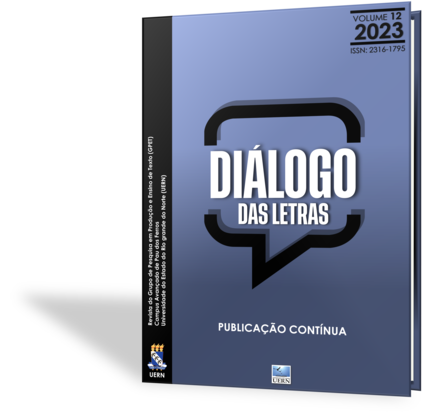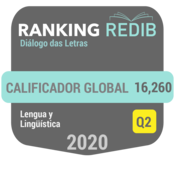Sistema lógico-semântico de expansão na reescrita de textos acadêmicos: escolhas linguísticas de uma estudante versus as escolhas do ChatGPT
DOI:
https://doi.org/10.22297/2316-17952023v12e02307Keywords:
Linguística Sistêmico-Funcional, Reescrita, ChatGPT, Inteligência ArtificialAbstract
This study addresses the linguistic choices present in the rewriting of texts produced by novice learners in an academic context and by the ChatGPT tool. The objective is to analyse these linguistic choices based on the logical-semantic expansion system (HALLIDAY; MATTHIESSEN, 2004; 2014) present in rewritten versions of the same text. Qualitative and interpretative in nature, the corpus consists of the writing and rewriting of a first-semester undergraduate student and three versions produced by ChatGPT, aimed at comparing these occurrences. The analysis focused on the nature of the changes in the complex sentences of all the rewritten versions, seeking to understand which changes in the logical-semantic system are recurring. The results show that expansion by intensification is prioritized by ChatGPT through the addition of modifiers, which differs from the student's choices. ChatGPT follows a pattern, starting with extended paratactic clauses (1 ^ +2) and continuing with elaborated hypotactic complex clauses (α ^ =β). ChatGPT offered different responses depending on the given command, in an attempt to resemble the rewriting, but showed difficulty in producing following extensive instructions and recognizing variables contained in the feedback. The contribution relates to understanding how ChatGPT reads the instructions provided to rewrite a text.
Downloads
References
ANDERSON, N.; BELAVY, D. L.; PERLE, S.M. et al. AI did not write this manuscript, or did it? Can we trick the AI text detector into generated texts? The potential future of ChatGPT and AI in Sports & Exercise Medicine manuscript generation. BMJ Open Sport & Exercise Medicine. v.9, e001568. 2023.
DÖRNYEI, Z. Research methods in Applied Linguistics. New York: Oxford University Press, 2007.
FRÖHLING, L.; ZUBIAGA, A. Feature-based detection of automated language models: Tackling GPT-2, GPT-3 and Grover. PeerJ Computer Science, v.7, n.e443, 2021.
GEHRMANN, S., STROBELT, H., & RUSH, A. M. GLTR: Statistical Detection and Visualization of Generated Text. arXiv:1906.04043). arXiv. 2019.
HALLIDAY, M. A. K. An introduction to functional grammar. London: Edward Arnold, 1985 [3. ed. Rev. by C. M. I. M. Matthiessen, 2004; 4. ed. Rev. by C. M. I. M. Matthiessen, 2014].
HALLIDAY, M. A. K. Language as a social semiotic: the social interpretation of language and meaning. London: Edward Arnold, 1978.
KASNECI, E., et al. “ChatGPT for Good? on Opportunities and Challenges of Large Language Models for Education.” EdArXiv, 30 Jan. 2023. Disponível em: https://edarxiv.org/5er8f/. Acesso em 20 de março de 2023.
KING, Michael R. Editorial. A Conversation on Artificial Intelligence, Chatbots, and Plagiarism in Higher Education. Cellular and Molecular Bioengineering, vol. 16, n. 1, p. 1–2, 2023.
KUMAR, A. HS. Analysis of ChatGPT Tool to Assess the Potential of its Utility for Academic Writing in Biomedical Domain. BEMS Reports, v.9, n. 1, p. 24-30, 2023.
MITROVIC, S. et al. ChatGPT or Human? Detect and Explain. Explaining Decisions of Machine Learning Model for Detecting Short ChatGPT-generated Text, arXiv:2301.13852v1 [cs.CL] 30 jan 2023.
PERKINS, M. Academic Integrity considerations of AI Large Language Models in the post-pandemic era: ChatGPT and beyond. Journal of University Teaching & Learning Practice, v. 20, no. 2, 2023.
ROSPIGLIOSI, P. ‘asher’. Artificial intelligence in teaching and learning: what questions should we ask of ChatGPT? Interactive Learning Environments, v.31, n. 1, p. 1-3, 2023.
THOMPSON, G. Introducing Functional Grammar. 3a. ed. Routledge/Taylor & Francis Group. London, 2014.
Downloads
Published
How to Cite
Issue
Section
License
Copyright (c) 2023 Diálogo das Letras

This work is licensed under a Creative Commons Attribution 4.0 International License.
A Diálogo das Letras não se responsabiliza por conceitos e opiniões emitidos pelos autores, tampouco manifesta, necessariamente, concordância com posições assumidas nos textos publicados. Além disso, os dados e a exatidão das referências citadas no trabalho são de inteira responsabilidade do(s) autor(es). Ao submeterem seus trabalhos, os autores concordam que os direitos autorais referentes a cada texto estão sendo cedidos para a revista Diálogo das Letras; ainda concordam que assumem as responsabilidades legais relativas às informações emitidas.
























